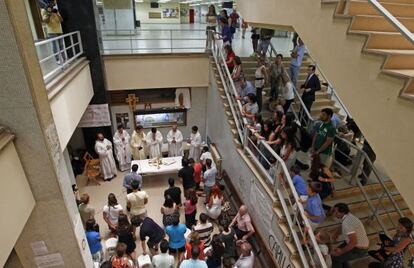Church may be forced to pay rent for Madrid campus chapels
Complutense University president locked in battle with archbishops over transfer of place of prayer

Madrid’s Complutense University is considering charging the Catholic Church rent for the use of campus chapels.
This large public university has eight chapels, and these have been routinely making headlines over controversial decisions that the Church sees as an attack against their faith, while university officials consider it a necessary step toward a more secular institution.
Lately, the media coverage is over the decision to transfer the chapel of the School of Geography and History to a different location. Catholic groups have collected more than 24,000 signatures against the move, and protest Masses are being held daily inside the main hall. The archbishops have rejected the change of location because the new premises are smaller and have no windows.
At noon on Monday, several hundred people attended the protest Mass in the presence of half-a-dozen priests who were performing confessions in the hallways. There was a sign with a sentence by Pope Francis: “Persecution against Christians today is stronger than in the early centuries.”
The Complutense has turned down petitions from the Islamic community to get their own places of prayer
Far from striking a conciliatory tone, university president José Carrillo has just opened up a new front. If the chapels are to stay, they should pay rent “for occupying land that belongs to the Complutense,” he told EL PAÍS.
Carrillo also said that there has been no progress in the ongoing negotiation to change the agreements protecting campus prayer rooms that were ratified in 1993 by the archbishops and then-university president Gustavo Villapalos.
The Complutense is one of Spain’s public universities with the largest number of chapels: eight, just like Madrid’s Polytechnic University. Four universities in the capital together add around 20 Catholic chapels, twice as many as the rest of Spain.
In late 2013, Complutense officials criticized the agreement (which is renewed every 10 years) and suggested that these places of prayer should either be closed down or turned into non-denominational chapels for all faiths.
But the Catholic Church remains unconvinced by this option, saying that different religions should get their own prayer rooms “depending on the number of faithful who demand it,” says Father Feliciano, head of the Catholic Church’s university delegation, Pastoral Universitaria.
Could this not be considered irregular financing of a religious institution?” José Carrillo, Complutense president
As for how much rent the university wants, the 2014 budget establishes rates ranging between €160 and over €5,000 depending on the premises and on the duration of the programmed events.
But Carrillo says that specific rates would have to be set for the chapels. A few weeks ago, he notes, the campus hosted a political event by Podemos, the new left-wing party, which paid a fee for using the facilities.
“If they hadn’t, it would have been tantamount to irregular party financing,” he said. “Could this not be considered irregular financing of a religious institution?”
But Father Feliciano does not see the similarity. “It would not be fair to have to pay. We are talking about Catholic university students. It’s as though they tried to charge student associations.” According to his own estimates, around 20 people regularly show up for daily Mass at the School of Geography, although the school dean brings that figure down to five, while 60 students attend the three daily Masses at the Law School.
The Complutense has turned down petitions from the Islamic community to get their own prayer rooms. “We’ve got other things to do right now,” said Carrillo, who would like to postpone the whole issue of the chapels until after next year’s elections for university president.
The controversy first hit the news in 2011, right before the last university elections. A group of female students entered the chapel at the School of Psychology, undressed and kissed one another in a protest performance that ended up with several arrests.
Tu suscripción se está usando en otro dispositivo
¿Quieres añadir otro usuario a tu suscripción?
Si continúas leyendo en este dispositivo, no se podrá leer en el otro.
FlechaTu suscripción se está usando en otro dispositivo y solo puedes acceder a EL PAÍS desde un dispositivo a la vez.
Si quieres compartir tu cuenta, cambia tu suscripción a la modalidad Premium, así podrás añadir otro usuario. Cada uno accederá con su propia cuenta de email, lo que os permitirá personalizar vuestra experiencia en EL PAÍS.
¿Tienes una suscripción de empresa? Accede aquí para contratar más cuentas.
En el caso de no saber quién está usando tu cuenta, te recomendamos cambiar tu contraseña aquí.
Si decides continuar compartiendo tu cuenta, este mensaje se mostrará en tu dispositivo y en el de la otra persona que está usando tu cuenta de forma indefinida, afectando a tu experiencia de lectura. Puedes consultar aquí los términos y condiciones de la suscripción digital.









































